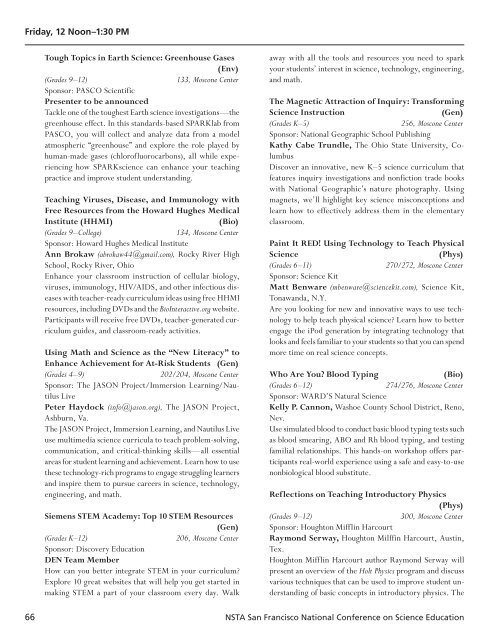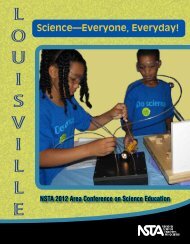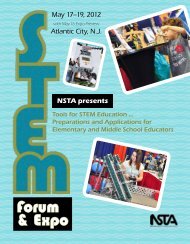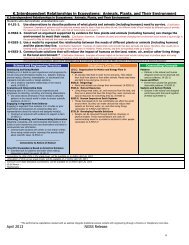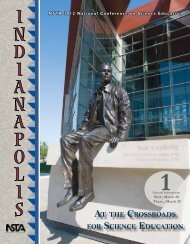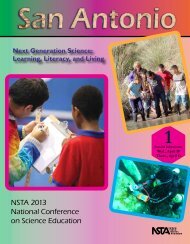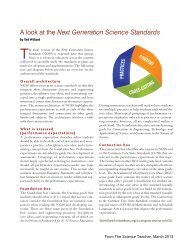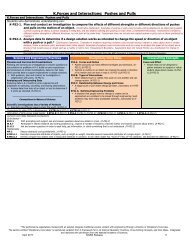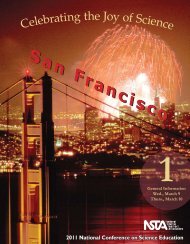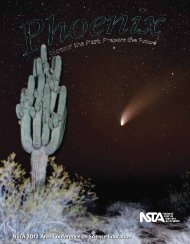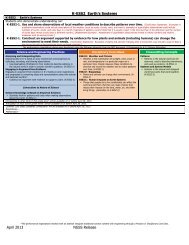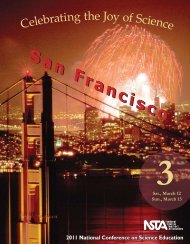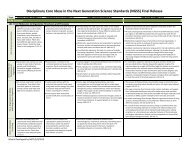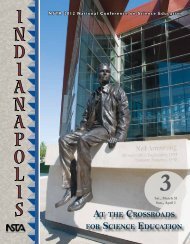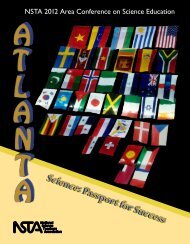San Francisco Program, Vol. 2: Friday - National Science Teachers ...
San Francisco Program, Vol. 2: Friday - National Science Teachers ...
San Francisco Program, Vol. 2: Friday - National Science Teachers ...
Create successful ePaper yourself
Turn your PDF publications into a flip-book with our unique Google optimized e-Paper software.
<strong>Friday</strong>, 12 Noon–1:30 PM<br />
Tough Topics in Earth <strong>Science</strong>: Greenhouse Gases<br />
(Env)<br />
(Grades 9–12)<br />
133, Moscone Center<br />
Sponsor: PASCO Scientific<br />
Presenter to be announced<br />
Tackle one of the toughest Earth science investigations—the<br />
greenhouse effect. In this standards-based SPARKlab from<br />
PASCO, you will collect and analyze data from a model<br />
atmospheric “greenhouse” and explore the role played by<br />
human-made gases (chlorofluorocarbons), all while experiencing<br />
how SPARKscience can enhance your teaching<br />
practice and improve student understanding.<br />
Teaching Viruses, Disease, and Immunology with<br />
Free Resources from the Howard Hughes Medical<br />
Institute (HHMI)<br />
(Bio)<br />
(Grades 9–College)<br />
134, Moscone Center<br />
Sponsor: Howard Hughes Medical Institute<br />
Ann Brokaw (abrokaw44@gmail.com), Rocky River High<br />
School, Rocky River, Ohio<br />
Enhance your classroom instruction of cellular biology,<br />
viruses, immunology, HIV/AIDS, and other infectious diseases<br />
with teacher-ready curriculum ideas using free HHMI<br />
resources, including DVDs and the BioInteractive.org website.<br />
Participants will receive free DVDs, teacher-generated curriculum<br />
guides, and classroom-ready activities.<br />
Using Math and <strong>Science</strong> as the “New Literacy” to<br />
Enhance Achievement for At-Risk Students (Gen)<br />
(Grades 4–9)<br />
202/204, Moscone Center<br />
Sponsor: The JASON Project/Immersion Learning/Nautilus<br />
Live<br />
Peter Haydock (info@jason.org), The JASON Project,<br />
Ashburn, Va.<br />
The JASON Project, Immersion Learning, and Nautilus Live<br />
use multimedia science curricula to teach problem-solving,<br />
communication, and critical-thinking skills—all essential<br />
areas for student learning and achievement. Learn how to use<br />
these technology-rich programs to engage struggling learners<br />
and inspire them to pursue careers in science, technology,<br />
engineering, and math.<br />
Siemens STEM Academy: Top 10 STEM Resources<br />
(Gen)<br />
(Grades K–12)<br />
206, Moscone Center<br />
Sponsor: Discovery Education<br />
DEN Team Member<br />
How can you better integrate STEM in your curriculum<br />
Explore 10 great websites that will help you get started in<br />
making STEM a part of your classroom every day. Walk<br />
away with all the tools and resources you need to spark<br />
your students’ interest in science, technology, engineering,<br />
and math.<br />
The Magnetic Attraction of Inquiry: Transforming<br />
<strong>Science</strong> Instruction<br />
(Gen)<br />
(Grades K–5)<br />
256, Moscone Center<br />
Sponsor: <strong>National</strong> Geographic School Publishing<br />
Kathy Cabe Trundle, The Ohio State University, Columbus<br />
Discover an innovative, new K–5 science curriculum that<br />
features inquiry investigations and nonfiction trade books<br />
with <strong>National</strong> Geographic’s nature photography. Using<br />
magnets, we’ll highlight key science misconceptions and<br />
learn how to effectively address them in the elementary<br />
classroom.<br />
Paint It RED! Using Technology to Teach Physical<br />
<strong>Science</strong><br />
(Phys)<br />
(Grades 6–11)<br />
270/272, Moscone Center<br />
Sponsor: <strong>Science</strong> Kit<br />
Matt Benware (mbenware@sciencekit.com), <strong>Science</strong> Kit,<br />
Tonawanda, N.Y.<br />
Are you looking for new and innovative ways to use technology<br />
to help teach physical science Learn how to better<br />
engage the iPod generation by integrating technology that<br />
looks and feels familiar to your students so that you can spend<br />
more time on real science concepts.<br />
Who Are You Blood Typing<br />
(Bio)<br />
(Grades 6–12)<br />
274/276, Moscone Center<br />
Sponsor: WARD’S Natural <strong>Science</strong><br />
Kelly P. Cannon, Washoe County School District, Reno,<br />
Nev.<br />
Use simulated blood to conduct basic blood typing tests such<br />
as blood smearing, ABO and Rh blood typing, and testing<br />
familial relationships. This hands-on workshop offers participants<br />
real-world experience using a safe and easy-to-use<br />
nonbiological blood substitute.<br />
Reflections on Teaching Introductory Physics<br />
(Phys)<br />
(Grades 9–12)<br />
300, Moscone Center<br />
Sponsor: Houghton Mifflin Harcourt<br />
Raymond Serway, Houghton Milffin Harcourt, Austin,<br />
Tex.<br />
Houghton Mifflin Harcourt author Raymond Serway will<br />
present an overview of the Holt Physics program and discuss<br />
various techniques that can be used to improve student understanding<br />
of basic concepts in introductory physics. The<br />
66 NSTA <strong>San</strong> <strong>Francisco</strong> <strong>National</strong> Conference on <strong>Science</strong> Education


